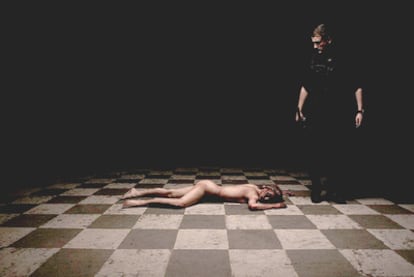"It's a horror movie, pure and simple"
Debate rages over decision to investigate Sitges Festival director for film screening
The debate is on regarding last week's decision by a Barcelona judge to investigate the director of the Sitges Film Festival for allowing two late-night screenings of A Serbian Film - which shows simulated sex scenes with children - at the last edition of the event. As the social networks rail against what they consider a form of censorship, the cultural world argues that you can't put restrictions on creative freedom. Abuse victims associations, meanwhile, say that not everything goes; not even in fiction.
Under Article 189 of the Penal Code, Sitges head Ángel Sala faces a prison sentence of up to three months for exhibiting pornographic material, regardless of whether or not it directly involves minors.
Writer and film critic Jesús Palacios thinks the law should not equate the simulation of a crime - in this case sexual aggression against minors - with the crime itself. The two controversial scenes in the film - one that depicts a newborn baby being raped and another showing sex with a five-year-old boy - are "ridiculous," he says, and shown "in a distorted way." It's not a pornographic film, he argues, but rather a horror film with some shots depicting extreme violence.
Josemi Beltrán, the new director of the San Sebastián Horror and Fantasy Film Festival, which was banned from showing the film by a court last November, agrees. "It's a horror movie, pure and simple," he says. Although the film is "unpleasant and aesthetically questionable," he continues, the problem is not about director Srdjan Spasojevic's lack of skill, but rather one of artistic freedom and the necessity of imposing limits. "The creation can be better or worse, but you have to be able to tackle all themes."
Although Jaume Balagueró, co-director of horror film REC, hasn't seen the movie, and "would never see it," he says the investigation of Sala "makes Spain look ridiculous." A Serbian Film has been shown at a dozen international festivals and picked up prizes at events in Porto, Serbia and Montreal.
The worry is that lawsuits such as the one brought by the child-protection association that led to Sala's investigation could drive cultural programmers to a kind of self-censorship. "They'll think a little more when confronted with a radical piece of cinema, because of the possible legal consequences," says Palacios.
"The content of the film seems totally excessive to us," says Guillermo Cánovas of the anti-child pornography NGO Protégeles. "These images hurt people. [...] And it doesn't matter whether it's a real image or a simulated one, the important thing is the impact it has."
"Aside from this," he adds, "we are not sure if the object of this film is to raise awareness."

Tu suscripción se está usando en otro dispositivo
¿Quieres añadir otro usuario a tu suscripción?
Si continúas leyendo en este dispositivo, no se podrá leer en el otro.
FlechaTu suscripción se está usando en otro dispositivo y solo puedes acceder a EL PAÍS desde un dispositivo a la vez.
Si quieres compartir tu cuenta, cambia tu suscripción a la modalidad Premium, así podrás añadir otro usuario. Cada uno accederá con su propia cuenta de email, lo que os permitirá personalizar vuestra experiencia en EL PAÍS.
¿Tienes una suscripción de empresa? Accede aquí para contratar más cuentas.
En el caso de no saber quién está usando tu cuenta, te recomendamos cambiar tu contraseña aquí.
Si decides continuar compartiendo tu cuenta, este mensaje se mostrará en tu dispositivo y en el de la otra persona que está usando tu cuenta de forma indefinida, afectando a tu experiencia de lectura. Puedes consultar aquí los términos y condiciones de la suscripción digital.
Últimas noticias
From Andorra to Gibraltar, a black market for Ozempic exploits its success: ‘They’re the most sought-after products in the world’
Magnets in their heads: How some animals guide themselves using the Earth’s magnetic field
From Hungary’s Orbán to Chile’s Kast: How Trump helps turbo charge the far right
The brief rise and retreat of Generation Z in Mexico
Most viewed
- Why we lost the habit of sleeping in two segments and how that changed our sense of time
- Trump’s obsession with putting his name on everything is unprecedented in the United States
- Charles Dubouloz, mountaineering star, retires at 36 with a farewell tour inspired by Walter Bonatti
- The Florida Keys tourist paradise is besieged by immigration agents: ‘We’ve never seen anything like this’
- Living in a motorhome due to soaring housing prices in Madrid: ‘I got used to it quickly, but I don’t idealize it’








































